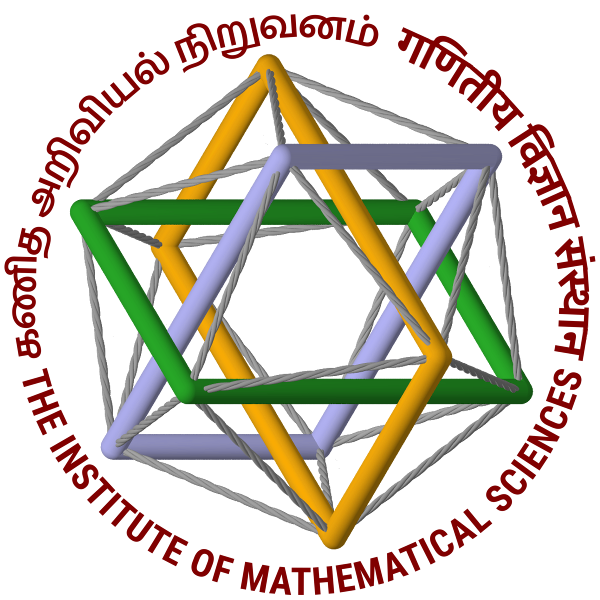IMSc offers two doctoral programmes in mathematics - the Ph.D and Integrated Ph.D. For eligibility requirements and application procedures, please refer to this webpage.
Students of both streams do basic coursework during the first few semesters after which they must successfully clear a qualifying examination in order to further continue in the programme.
Outline
A rough breakup of the programmes is as follows:
-
Ph. D
- Semester I : 4 core courses.
- Semester II: 2 core courses + 1 elective.
- Semesters III and IV: Coursework as prescribed by guide/mentor.
-
Integrated Ph. D:
- Semester I : 4 core courses.
- Semester II: 2 core courses + 1 elective.
- Semesters III and IV : 4 courses and M.Sc. thesis (may be split between the semesters as desired).
The syllabi of the courses is available here.
Grades and minimum requirements
Grades are assigned to students based on their performance in each course. The grades are:
A=4, B=3, C=2, D=1, F=fail
In order to stay in the doctoral programme, a student must have no F grade in any course, and must maintain a cumulative grade point average (CGPA) of 2 at the end of the first year.
If a student has a CGPA below 2 at the end of the first term, (s)he will be warned/cautioned. If a student has a CGPA below 2 at the end of the second semester, (s)he will be advised that (s)he cannot continue in the doctoral programme and must consider the option of switching to an M. Phil. degree programme or to just an M.Sc. degree programme according as (s)he is in the Ph.D. programme or the Integrated Ph.D. programme.
For the purposes of the above considerations, there will be no question of a student taking a re-exam in a test, or dropping some elective courses where (s)he may have a poor grade. However, a student may drop an elective course before the end of the third week of coursework.
Coursework Interview and Tentative guide/mentor
At the end of the first year, each student must pass an oral exam that will test the material covered in the first year courses. Once the student passes this exam, (s)he must, with the help of the faculty, convince a faculty member (in his/her subject) to agree to be a tentative guide. This tentative guide should initially advise the student on an appropriate study programme in the second year, consistent with the student's strengths and taste. This study programme should then be approved by the monitoring committee of the student before the start of the second year's coursework. The monitoring committee should identify a suitable faculty member, who may not (but would typically) be the tentative guide/mentor, to guide the student's M.Sc. thesis (in case of students of the integrated Ph.D. programme.)
Qualifying examinations
In order to be eligible to register for a Ph.D., each student must pass a qualifying examination conducted by her/his monitoring committee. This exam will typically assess how well the student has undergone the study programme suggested by the tentative guide, as well as gauge the general level of the student's preparedness for undertaking a doctoral programme.
The qualifying exam for a student of the integrated Ph.D. programme will be held concurrently with the exams of the final - IVth - semester of the M.Sc. part of the programme; it will be an extension of her/his M.Sc. thesis viva-voce examination.
Students of the Ph.D. programme would typically take the qualifying exam at the end of the third semester. If a student passes the qualifying exam, the report of the monitoring committee of this exam will name the future thesis guide of the student. (Likewise, the report on a successful performance in the qualifying exam by a student of the Integrated Ph.D. programme will also name the future thesis guide of the student.)
If a student of the Integrated Ph.D. programme does not pass the qualifying exam, but has maintained minimum grade requirements in the coursework and M.Sc. thesis, (s)he will be asked to leave with the M.Sc. degree.
Monitoring and Doctoral Committees
Each student will be assigned a monitoring committee of faculty members as soon as (s)he enters the programme, which shall monitor his/her progress. The membership of the monitoring committee will change as the student evolves through the system. (A possible model will consist of the course coordinator as convenor, and have one teacher from each of the two semesters of the first year, while the tentative guide together with teachers of second year courses for a student will constitute her/his monitoring committee in the second year.)
Once the student has successfully cleared the qualifying exams and a doctoral guide has been identified, a Doctoral Committee will be constituted, which will monitor the subsequent progress of the student.
